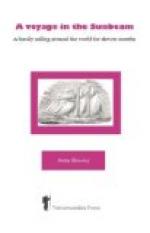The ‘Wilmington’ came in this morning. Her captain declares that as the ‘Monkshaven’ was not hove-to, he never thought that there could be anything seriously amiss with her. His glass was not good enough to enable him to make out the union-jack reversed, or the signal of distress, which he therefore supposed to be merely the ship’s number. It was satisfactory to hear this explanation; and as not only the interests of humanity, but his own, were involved, there is every reason to believe that his account of the transaction is perfectly true.
CHAPTER IX.
SANDY POINT TO LOTA BAY.
And far abroad the canvas wings extend, Along the glassy plain the vessel glides, While azure radiance trembles on her sides. The lunar rays in long reflection gleam, With silver deluging the fluid stream.
Sunday, October 8th.—At 6 a.m. we weighed anchor, and proceeded on our voyage. At first there was not much to admire in the way of scenery, the shores being low and sandy, with occasional patches of scrubby brushwood, and a background of granite rocks and mountains.
Soon after passing Port Famine we saw the bold outline of Cape Froward, the southernmost point of South America, stretching into the Straits. It is a fine headland, and Tom ordered the engines to be stopped in order to enable Mr. Bingham to sketch, and me to photograph, both it and the splendid view back through the channel we had just traversed to the snowy range of mountains in the distance, crowned by Mount Sarmiento, not unlike the Matterhorn in appearance.
At this point the weather generally changes, and I suppose we must look forward to living in mackintoshes for some little time to come.
In the afternoon, when in English Reach, where many vessels have been lost, great excitement was caused on board by the appearance of a canoe on our port bow. She was stealing out from the Barbara Channel, and as she appeared to be making direct for us, Tom ordered the engines to be slowed. Her occupants thereupon redoubled their efforts, and came paddling towards us, shouting and making the most frantic gesticulations, one man waving a skin round his head with an amount of energy that threatened to upset the canoe. This frail craft, upon a nearer inspection, proved to be made only of rough planks, rudely tied together with the sinews of animals; in fact, one of the party had to bale constantly, in order to keep her afloat. We flung them a rope, and they came alongside, shouting ‘Tabaco, galleta’ (biscuit), a supply of which we threw down to them, in exchange for the skins they had been waving; whereupon the two men stripped themselves of the skin mantles they were wearing, made of eight or ten sea-otter skins sewed together with finer sinews than those used for the boat, and handed them up, clamouring for more tobacco, which we gave them, together with some beads and knives.[4] Finally, the woman, influenced by this example, parted with her sole garment, in return for a little more tobacco, some beads, and some looking-glasses I had thrown into the canoe.




